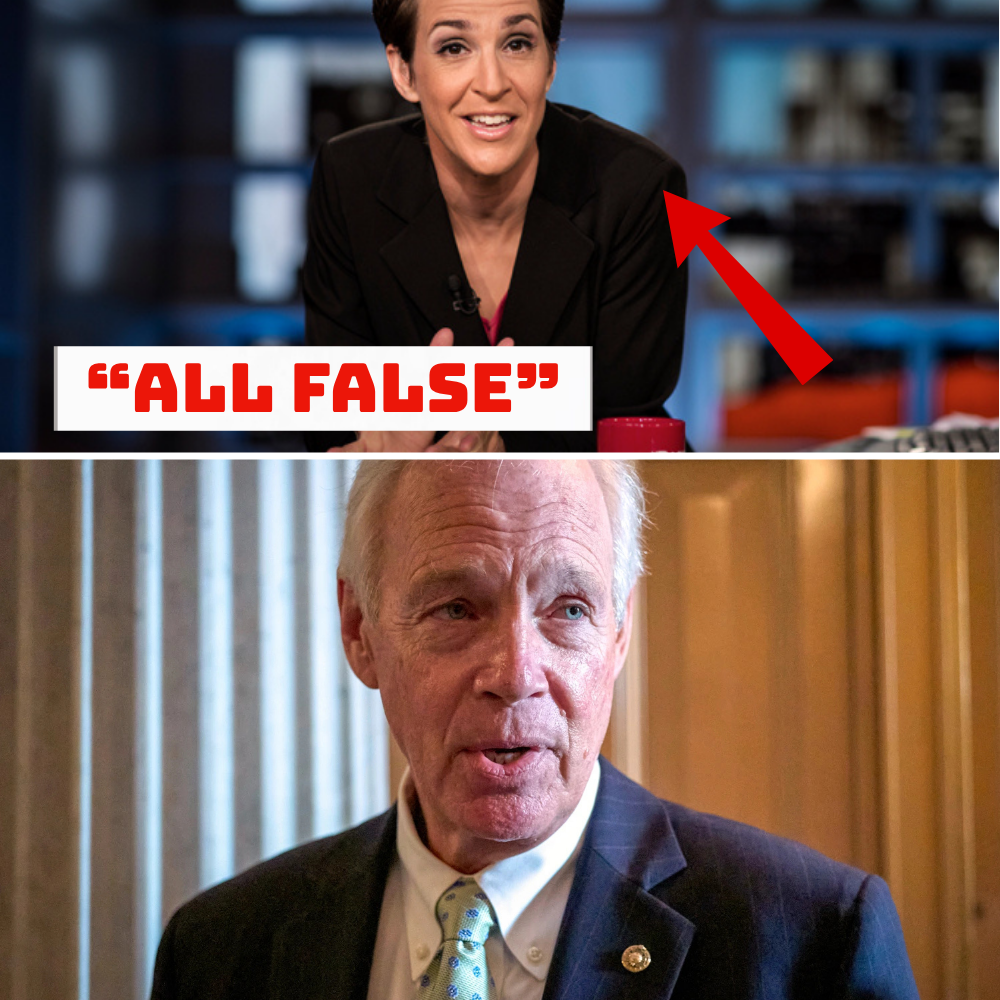A Fiscal Hawk’s Bold Promise
In the hallowed halls of the U.S. Senate, where political theater often overshadows substance, Wisconsin’s Republican Senator Ron Johnson has long styled himself as a fiscal warrior, a self-proclaimed guardian of America’s financial future. In the spring of 2025, as the Republican Party rallied behind President Donald Trump’s sweeping domestic policy package—dubbed the “One Big Beautiful Bill Act”—Johnson seized the spotlight. With the bill poised to reshape taxes, healthcare, and immigration policy, he declared himself “serious” about wielding his considerable influence to force changes, vowing to slash the nation’s ballooning deficit. His words resonated with fiscal conservatives, who saw in him a rare ally willing to challenge the GOP’s own agenda in the name of fiscal responsibility. But was this defiance genuine, or merely a calculated performance? Political commentator Rachel Maddow, known for her incisive critiques, didn’t hesitate to call it out: “Clearly, he doesn’t mean it.” Her accusation has sparked a firestorm, raising questions about Johnson’s motives, the megabill’s true cost, and the GOP’s commitment to fiscal discipline.
The “One Big Beautiful Bill Act,” a cornerstone of Trump’s second-term agenda, is a behemoth of legislation. Spanning over 1,000 pages, it promises to extend tax cuts for high earners, eliminate taxes on tips and overtime, fund a border wall, expand military and immigration enforcement spending, and impose significant cuts to Medicaid and food assistance programs. Yet, its fiscal impact has drawn intense scrutiny. Independent analyses estimate the bill could add between $2.4 trillion and $3.8 trillion to the federal deficit over the next decade, a figure that has alarmed fiscal hawks within the GOP. Johnson, a Tea Party favorite who has built his career railing against government overspending, positioned himself as the bill’s chief skeptic, warning that it would “mortgage our children’s future.” His initial opposition, coupled with threats to derail the bill unless deeper spending cuts were included, suggested a principled stand. But as events unfolded, the cracks in his resolve became impossible to ignore.
The Rise of Ron Johnson, Fiscal Hawk
To understand Johnson’s role in this saga, one must first examine his political journey. A businessman-turned-senator, Johnson entered politics in 2010, riding the Tea Party wave that swept Republicans into power. From his early days in Oshkosh, Wisconsin, he cultivated an image as a numbers-driven pragmatist, decrying federal spending and championing limited government. Over the years, he has consistently opposed bills that increase the national debt, famously delaying a 2017 tax cut until it included a loophole benefiting his own business interests. His rhetoric has been unwavering: deficits are “immoral,” and unchecked spending threatens the nation’s future. At the Wisconsin GOP Convention in May 2025, Johnson doubled down, using charts and slides to illustrate how the megabill’s tax policies and spending would exacerbate the deficit, urging a return to pre-pandemic spending levels.
Johnson’s stance initially appeared to carry weight. With Republicans holding a slim 53-47 Senate majority, the party could afford to lose only three votes to pass the bill through the filibuster-proof reconciliation process. Johnson, alongside fellow deficit hawks like Senators Rand Paul of Kentucky and Mike Lee of Utah, signaled he would not support the bill without significant changes. He demanded cuts far beyond the $1.5 trillion in reductions proposed over ten years, dismissing them as “a rounding error.” His public statements were fiery, accusing the bill of accepting a “new normal” of $2 trillion annual deficits inherited from the Biden administration. He even claimed to have “everybody’s attention” on Capitol Hill, suggesting he held the leverage to reshape the legislation. For a moment, it seemed Johnson might force the GOP to confront its fiscal contradictions.
The Turning Point: A Deal with Trump
The tide began to shift in June 2025. After weeks of public posturing, Johnson met with President Trump and White House officials at a tense White House summit. The details of their discussion remain private, but the outcome was clear: Johnson softened his stance. Reports indicate that Trump and his team promised to work with Johnson on future spending cuts, potentially in a second bill. In exchange, Johnson agreed to advance the megabill past a critical procedural vote, a move that stunned his fiscal conservative allies. He also proposed an amendment to slash Medicaid further, tying his support for the bill to its passage. When the amendment failed to secure a vote, many expected Johnson to hold firm. Instead, by July 1, 2025, he announced his support for the bill, releasing a statement praising its alignment with Trump’s agenda.
This abrupt reversal fueled accusations of hypocrisy. Johnson’s critics pointed out that the bill he now backed would increase the deficit by trillions, contradicting his earlier demands for fiscal restraint. The Congressional Budget Office’s estimate of a $2.4 trillion deficit increase over ten years, coupled with projections of 11 million Americans losing health insurance due to Medicaid cuts, painted a grim picture. Johnson’s claim that the bill preserved Medicaid’s “original purpose” rang hollow to those who saw it as a betrayal of vulnerable constituents. In Wisconsin, where 1.3 million residents rely on BadgerCare (the state’s Medicaid program), the proposed cuts sparked outrage. Stories of individuals like Shaniya Cooper, a Milwaukee college student with lupus who feared losing her coverage, underscored the human cost of the bill’s priorities.
Rachel Maddow’s Critique: Calling Out the Charade
Enter Rachel Maddow, the MSNBC host whose sharp commentary has long challenged political doublespeak. On her show, Maddow dissected Johnson’s flip-flop with characteristic precision. She argued that his initial defiance was a performance, a way to burnish his fiscal hawk credentials without risking his standing in the Trump-aligned GOP. By ultimately supporting the bill, Maddow contended, Johnson revealed his true priorities: loyalty to Trump over principle. Her assertion that “clearly he doesn’t mean it” when he claimed to be serious about deficit reduction struck a chord with viewers, amplifying the narrative that Johnson’s fiscal rhetoric was little more than political theater.
Maddow’s critique resonates in the context of Johnson’s broader career. He has a history of taking controversial stances, from questioning COVID-19 vaccines to downplaying the January 6 Capitol riot. His 2022 debate performance, where he accused the FBI of targeting him with a “corrupt” briefing about Russian disinformation, drew laughter from audiences, highlighting his penchant for provocative claims. These incidents have painted Johnson as a polarizing figure, one whose commitment to fiscal responsibility is often overshadowed by his alignment with far-right causes. Maddow’s commentary tapped into this perception, framing Johnson’s megabill saga as the latest chapter in a pattern of inconsistency.
The Bigger Picture: GOP Fiscal Hypocrisy?
Johnson’s actions reflect a broader tension within the Republican Party. For decades, GOP leaders have campaigned on fiscal responsibility, decrying deficits under Democratic administrations. Yet, under Republican presidents, the party has often embraced policies that balloon the debt. The 2017 Trump tax cuts, which Johnson supported after securing personal benefits, added $1.9 trillion to the deficit. The 2025 megabill, with its mix of tax cuts for the wealthy and spending increases for defense and border security, follows a similar playbook. Johnson’s brief rebellion, followed by his capitulation, underscores the difficulty of maintaining fiscal discipline in a party increasingly defined by loyalty to Trump.
The bill’s passage through the Senate remains uncertain. While Johnson’s vote secured its advancement, other senators, including Rand Paul and Josh Hawley, continue to raise concerns about the debt ceiling increase and Medicaid cuts, respectively. Democrats, led by Wisconsin Senator Tammy Baldwin, have seized on the bill’s healthcare impacts, warning of devastating consequences for states like Wisconsin. The narrow Republican majority means that any further defections could jeopardize the bill, forcing negotiations that may dilute its scope.
What Lies Ahead
As the July 4, 2025, deadline set by Trump looms, Johnson finds himself at a crossroads. His decision to back the megabill has alienated some of his Tea Party base, who view it as a betrayal of his fiscal principles. Yet, his alignment with Trump ensures his relevance within the GOP, a party where dissent is increasingly rare. For voters in Wisconsin, the stakes are high. The bill’s proposed cuts to Medicaid and food assistance threaten to reshape the state’s social safety net, while its tax policies favor the wealthy at the expense of long-term fiscal stability.
Rachel Maddow’s critique may prove prescient if the bill’s deficit impact becomes a political liability for Republicans. For now, Johnson’s legacy as a fiscal hawk hangs in the balance, tainted by accusations that his “serious” stance was anything but. As the Senate debates the megabill’s final form, the nation watches, wondering whether Johnson’s rhetoric will ever match his actions—or if, as Maddow suggests, it was all just a show.



